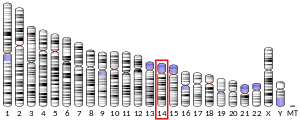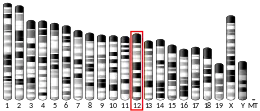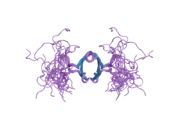Protein salvador homolog 1 is a protein that in humans is encoded by the SAV1 gene.[5][6][7]
WW domain-containing proteins are found in all eukaryotes and play an important role in the regulation of a wide variety of cellular functions such as protein degradation, transcription, and RNA splicing. This gene encodes a protein which contains 2 WW domains and a coiled-coil region. It is ubiquitously expressed in adult tissues. The encoded protein is 94% identical to the mouse protein at the amino acid level.[7]
References
- 1 2 3 GRCh38: Ensembl release 89: ENSG00000151748 - Ensembl, May 2017
- 1 2 3 GRCm38: Ensembl release 89: ENSMUSG00000021067 - Ensembl, May 2017
- ↑ "Human PubMed Reference:". National Center for Biotechnology Information, U.S. National Library of Medicine.
- ↑ "Mouse PubMed Reference:". National Center for Biotechnology Information, U.S. National Library of Medicine.
- ↑ Tapon N, Harvey KF, Bell DW, Wahrer DC, Schiripo TA, Haber DA, Hariharan IK (Aug 2002). "salvador Promotes both cell cycle exit and apoptosis in Drosophila and is mutated in human cancer cell lines". Cell. 110 (4): 467–78. doi:10.1016/S0092-8674(02)00824-3. PMID 12202036.
- ↑ Valverde P (Oct 2000). "Cloning, expression, and mapping of hWW45, a novel human WW domain-containing gene". Biochem Biophys Res Commun. 276 (3): 990–8. doi:10.1006/bbrc.2000.3582. PMID 11027580. S2CID 22968498.
- 1 2 "SAV1 salvador family WW domain containing protein 1 [ Homo sapiens (human) ]".
Further reading
- Maruyama K, Sugano S (1994). "Oligo-capping: a simple method to replace the cap structure of eukaryotic mRNAs with oligoribonucleotides". Gene. 138 (1–2): 171–4. doi:10.1016/0378-1119(94)90802-8. PMID 8125298.
- Suzuki Y, Yoshitomo-Nakagawa K, Maruyama K, et al. (1997). "Construction and characterization of a full length-enriched and a 5'-end-enriched cDNA library". Gene. 200 (1–2): 149–56. doi:10.1016/S0378-1119(97)00411-3. PMID 9373149.
- Strausberg RL, Feingold EA, Grouse LH, et al. (2003). "Generation and initial analysis of more than 15,000 full-length human and mouse cDNA sequences". Proc. Natl. Acad. Sci. U.S.A. 99 (26): 16899–903. Bibcode:2002PNAS...9916899M. doi:10.1073/pnas.242603899. PMC 139241. PMID 12477932.
- Yoo NJ, Soung YH, Lee JW, et al. (2003). "Mutational analysis of salvador gene in human carcinomas". APMIS. 111 (6): 595–8. doi:10.1034/j.1600-0463.2003.1110601.x. PMID 12969014. S2CID 43269337.
- Ota T, Suzuki Y, Nishikawa T, et al. (2004). "Complete sequencing and characterization of 21,243 full-length human cDNAs". Nat. Genet. 36 (1): 40–5. doi:10.1038/ng1285. PMID 14702039.
- Gerhard DS, Wagner L, Feingold EA, et al. (2004). "The Status, Quality, and Expansion of the NIH Full-Length cDNA Project: The Mammalian Gene Collection (MGC)". Genome Res. 14 (10B): 2121–7. doi:10.1101/gr.2596504. PMC 528928. PMID 15489334.
- Chan EH, Nousiainen M, Chalamalasetty RB, et al. (2005). "The Ste20-like kinase Mst2 activates the human large tumor suppressor kinase Lats1". Oncogene. 24 (12): 2076–86. doi:10.1038/sj.onc.1208445. PMID 15688006. S2CID 27285160.
- Benzinger A, Muster N, Koch HB, et al. (2005). "Targeted proteomic analysis of 14-3-3 sigma, a p53 effector commonly silenced in cancer". Mol. Cell. Proteomics. 4 (6): 785–95. doi:10.1074/mcp.M500021-MCP200. PMID 15778465.
- Callus BA, Verhagen AM, Vaux DL (2006). "Association of mammalian sterile twenty kinases, Mst1 and Mst2, with hSalvador via C-terminal coiled-coil domains, leads to its stabilization and phosphorylation". FEBS J. 273 (18): 4264–76. doi:10.1111/j.1742-4658.2006.05427.x. PMID 16930133. S2CID 8261982.
This article is issued from Wikipedia. The text is licensed under Creative Commons - Attribution - Sharealike. Additional terms may apply for the media files.





